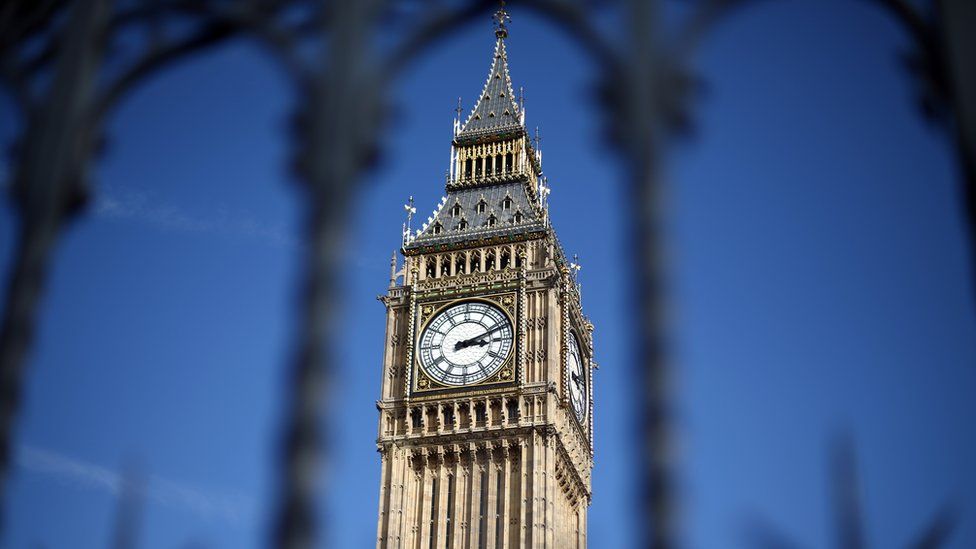Could a new political party be on the way?
- Published

Whispers of collaboration waft through the air. Rumours of a new political entity emerging into the light. Stories of politicians ready to cast aside tribal instinct and join something new.
But that is quite enough about the political intrigue in Germany where, weeks before the general election, there is no doubt breathless discussion in the cafes near the Bundestag about who Angela Merkel may end up working with if she's returned as chancellor again.
I talk of the occasional chat here, among those who describe themselves as forced to sleep on the political streets: homeless in the era of Brexit and Jeremy Corbyn.
Destitute, desperate and with a desire for something different, the story goes, they are smooching their way discreetly towards an immaculate political conception.
They are searching for the Anglo-Saxon equivalent of France's En Marche, the miracle birth over the water.
President Emmanuel Macron built his own political kit car widget by widget, and, fuelled by the French electorate, drove it straight to the Elysee Palace.
So this political correspondent peeled himself away from the feverish summer squalls over the Big Ben bong ban, and instead made some inquiries.
'Militant, muscular moderates'
One household name had already told me privately that they frequently passed colleagues from other parties in the corridors here, and thought that they had much more in common with them than plenty of their own supposed political brethren.
Another well-known politician told me of their desire to "create a home for those deeply politically engaged people who I call the 'militant, muscular moderates'".
"On the surface, there is the two-party system, but it is more complex than that," I was told.
"There is a lot of voter churn - the electorate is soft and fluid."
That's Westminster speak for: "No-one's quite sure what's going on, so anything's possible." Possibly.
Look closely and what could be the embryonic beginnings of a new party are there.
There was what was called the Progressive Alliance at this year's general election.
There were 42 seats across the UK where candidates broadly of the left stood aside with the intention of helping another candidate on the left beat the Conservatives.
In 38 of them, the Green Party didn't put up a candidate. In two, the Liberal Democrats didn't bother. And in one, the Women's Equality Party didn't. Not one Labour candidate stood aside.
Labour boost
Then there is the More United campaign. It says that at the general election it "backed 49 candidates from five different parties. Of these, 34 have been elected to be members of Parliament."
Of those, 26 were Labour, five were Lib Dem and there was one each for the Conservatives, Greens and the SNP.
Again, then, the same asymmetry: Labour was the principal beneficiary.
But glance towards the Conservatives and some see contemporary politics as a doughnut or a mint: something with a large hole in the centre.
There's "a real gap in the middle of politics at the moment between the Corbynistas and the hard Brexiteers," says the former Chancellor George Osborne in an interview with Influence, a magazine for the PR industry, to be published next month.
'Tribal blindness'
Another Tory tells me they are "frightened". Politics, they say, "is dominated by the far-left and the far-right".
But, they point out, politics for most at Westminster is like supporting a football team: tribal blindness reigns. Plus, there's the 2017 general election result.
Two quotes from my notebook here: "The election changed everything" and "A new party is not a goer".
These remarks from two people within Labour, one of whom thought, until June, that their party was "more likely than not to split".
Next, a third voice. A trenchant, persistent critic of Jeremy Corbyn who still harbours vast doubts about him, but acknowledges his election performance reshaped the landscape.
"There is no place - and no need - for another party. He killed that. It is dead, literally dead. You don't vote against someone who is going to get you into power."
You'll have noticed in this report the absence of people speaking on the record.
There's a good reason for that. Beyond saying "it's not going to happen," plenty are reluctant to talk publicly.
For the adhesive that binds parties together becomes altogether stickier when the two giants of Westminster politics each poll at least 40% of the vote.
Even the other established parties resemble toddlers in a world of giants, reducing the nascent rumblings described above to the microscopic level.
And then, the bete noire of any potential political pregnancy: the first-past-the-post electoral system for Westminster. It requires concentrated pockets of support to ensure any breakthrough.
Glance into the graveyard of political failure, and you see the tombstones of Veritas, Libertas, The Jury Team, No2EU and Your Party.
The one example still alive: UKIP. But even it only ever managed to win one seat at a general election.
It won't stop the chatter, the never-ending asking of the question: "What next?"
And yes, it's been a rough old time at Westminster recently for our old friend conventional wisdom.
But, for now at least, I see little sign of the midwives gathering or a delivery suite assigned for the birth of a new political giant.
- Published9 June 2017
- Published10 May 2017
- Published28 December 2016
- Published19 September 2016